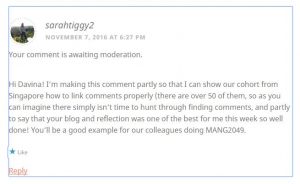
What Is The Good Of Experience If You Do Not Really Reflect? – Frederick the Great
Created using Canva
Introduction
After reviewing blog posts created by my peers, I realised the difficulty in writing a concise, creative post that would appeal to readers. The word limit itself is a challenge to overcome, but the real task lies in the use of attractive infographics.
Digital Immigrants vs. Digital Natives Reflection
Finding other perspectives on this debate further enhanced my understanding.
Continue reading →












